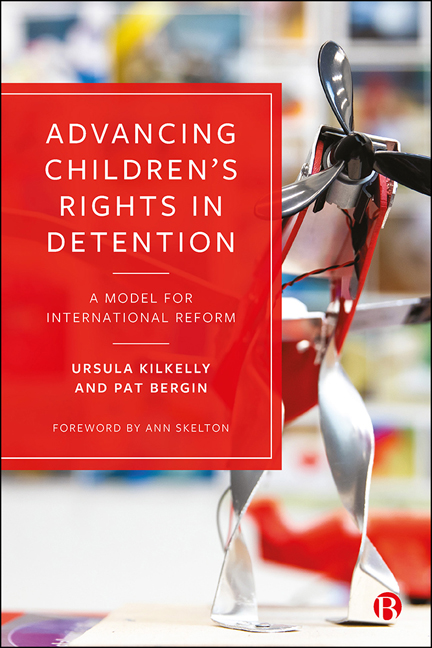Book contents
- Frontmatter
- Contents
- List of Cases and Instruments
- List of Figures
- About the Authors
- Acknowledgements
- Foreword
- Introduction
- 1 Children’s Rights in Detention
- 2 An International Perspective
- 3 Irish Youth Justice Law and Policy
- 4 Introducing Child Detention in Ireland
- 5 Oberstown and the Process of Change
- 6 Implementing Children’s Rights in Detention
- 7 Children’s Rights to Protection from Harm
- 8 Staff Wellbeing and Communication
- 9 International and National Influences and Advocacy
- 10 Reflections: Enablers and Barriers to Reform
- Afterword
- References
- Index
9 - International and National Influences and Advocacy
Published online by Cambridge University Press: 13 May 2022
- Frontmatter
- Contents
- List of Cases and Instruments
- List of Figures
- About the Authors
- Acknowledgements
- Foreword
- Introduction
- 1 Children’s Rights in Detention
- 2 An International Perspective
- 3 Irish Youth Justice Law and Policy
- 4 Introducing Child Detention in Ireland
- 5 Oberstown and the Process of Change
- 6 Implementing Children’s Rights in Detention
- 7 Children’s Rights to Protection from Harm
- 8 Staff Wellbeing and Communication
- 9 International and National Influences and Advocacy
- 10 Reflections: Enablers and Barriers to Reform
- Afterword
- References
- Index
Summary
Introduction
It has been observed that despite some weaknesses, international children’s rights standards on youth justice are ‘an effective benchmark against which law, policy and practice can be measured’ (Kilkelly, 2008a, p 191). Of course, in the absence of effective enforcement mechanisms, implementation of standards depends on the advocacy, support and scrutiny of national and international bodies. Ireland has an active human rights community and children's sector with organizations that have actively influenced the reform of child detention in Ireland. As a state party to multiple United Nations and Council of Europe human rights treaties, Ireland is subject to the monitoring and scrutiny of these bodies, which have played a similarly important role in advocating reform. Given legitimate public concern, child detention has also been the subject of parliamentary scrutiny and media interest in Ireland, as elsewhere. All of this combined, in recent years, to place the reform of child detention under intense and regular scrutiny.
The aim of this chapter is to explore how these external influences helped to bring about the implementation of children's rights standards in Oberstown Children Detention Campus. It begins with an analysis of the monitoring of child detention by the Committee on the Rights of the Child (the CRC Committee), the European Committee for the Prevention of Torture and Inhuman or Degrading Treatment or Punishment (CPT) and the European Commissioner for Human Rights and the impact that their recommendations had on reforms. The chapter then moves to the national level where the impact of bodies such as the Children's Rights Alliance, the Irish Penal Reform Trust and statutory human rights bodies is outlined. Finally, the chapter highlights the role of the Oireachtas (Parliament) and media in providing a further layer of public scrutiny. Overall, the chapter aims to illustrate the important role played by these various bodies in promoting the reform of child detention through an approach that scrutinized and challenged in equal measure. The chapter ends with some reflections on the impact of the intense scrutiny of the period.
International influences
The Committee on the Rights of the Child
Ireland ratified the United Nations Convention on the Rights of the Child (CRC) in 1992, meaning that the development of the modern Irish youth justice system took place in parallel with implementation of the CRC during this period.
- Type
- Chapter
- Information
- Advancing Children's Rights in DetentionA Model for International Reform, pp. 139 - 154Publisher: Bristol University PressPrint publication year: 2021



